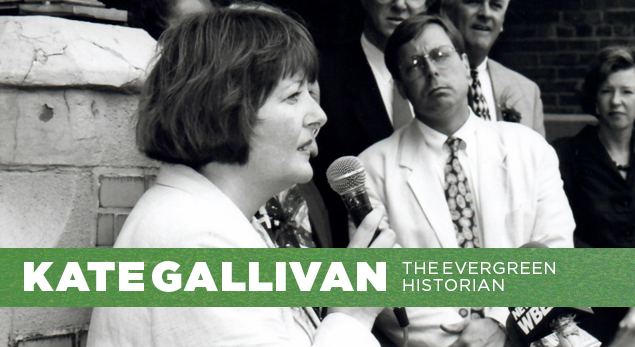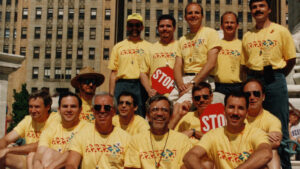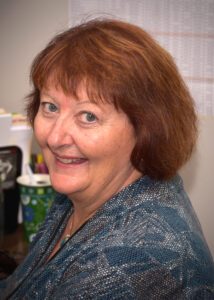Kate Gallivan, the Evergreen Historian
November 30, 2023

40 years ago this month, in November of 1983, a small group of volunteers led by Dr. Ross Hewitt officially incorporated as the Western New York AIDS Program: the organization that would go on to be renamed Evergreen Health. Throughout our 40th birthday year we’ve been reflecting on our history, celebrating how far we’ve come, and looking forward as we continue to grow.
In honor of our birthday month we sat down with Kate Gallivan, senior director of grants management and Evergreen’s “unofficial historian.” Kate is not only the creator of Evergreen’s historical timeline, she’s one of our longest-standing employees and has been a key part of 28 out of 40 years of Evergreen’s history and counting.
Kate first walked in the doors of the Western New York AIDS Program (WYNAP) in 1988 because she wanted to get involved with caring for her friends and community members who were being affected by the emerging HIV and AIDS crisis.
“I think we’re right where we should be, 40 years later.” – Kate Gallivan
Kate says that when she saw the generosity and passion of WNYAP staff and volunteers as they cared for people who were dying of AIDS-related illnesses, she thought “I’m right where I need to be.” Before joining WNYAP, Kate was working at a large hospital, and chose to pursue a career at WYNAP instead because “the heart and soul of this organization were something I’ve never experienced anywhere else.”
During Kate’s first days at WNYAP in 1988, she served as program director, to develop systems to support staff who were doing boots-on-the-ground work with clients who were dying of AIDS-related illnesses, and educating community members and medical providers about HIV and AIDS.
Throughout the 90’s, Kate says, we were on the front lines of a public health crisis that medicine didn’t yet know how to fight, and we were also fighting a huge amount of stigma and discrimination towards people with HIV and AIDS. Because AIDS care wasn’t a popular cause for donors, finding the money to keep the doors open long-term as a non-profit was also a real struggle. On top of it all, Kate and the rest of the staff were working while grieving the losses of countless friends, colleagues and community members to AIDS-related illnesses.

Agency staff at the first Buffalo AIDS Walk in 1994
Kate says, “there were uphill battles every direction we turned, but we were really good at staying positive in the face of all the challenges.” The agency got creative so that we could continue providing care to those in need: in 1992 WNYAP restructured the organization to ensure our long-term stability. Kate was promoted to chief operating officer and took charge of overseeing our programs, staff and volunteers. She’s held other roles in the organization since, and is currently our senior director of grants management.
Kate says that our determination and willingness to take risks let Evergreen grow through the many challenges we faced. As advances were made in HIV prevention and treatment, we were able to address the evolving needs of the community by opening new services throughout the years. Kate credits our flexibility and long-term success to additions like our Primary and Specialty Care licensure in 1996, taking on management of the Syringe Exchange Program in 2007, getting our Pharmacy license in 2011, our OASAS license in 2015, our Mental Health Clinic license in 2021, and opening the Drop-in Center in 2022.
What has changed in the time you’ve been at Evergreen?
Kate: “We were only doing HIV work at first. When rapid HIV testing was approved by the FDA in 2003, it was a total game changer for the work we were doing. It gave us a whole different level of service to be able to provide to people, and an opportunity to meet with someone individually and talk about their risk, talk about what it would mean for them to know what their HIV status. Before that, people were afraid to get tested. I never thought I would see the day when people could live into old age with HIV. It’s just incredible, the treatment advances, and especially now with injectable treatment. It was such a barrier for a lot of people.
The prevention efforts totally evolved into behavior change interventions: talking with people about understanding their own risky behaviors and giving them tools that they could use to navigate all of that in their personal lives. It was a huge paradigm shift from just talking with people about how you get HIV and how you don’t.
The other thing that stands out the most for me in terms of change was when the Syringe Exchange Program became part of our organization. It added depth to our work with people who use drugs. Having the Syringe Exchange right on site, having our staff so closely connected with exchange participants, being able to link the exchange participants with all of our services on the spot, it was just so cool to see the impact. It helped us more fully integrate harm reduction philosophy and principles with all of our programs. It was always part of our fabric, the harm reduction approach: meeting people where they are, and not judging people, but with syringe exchange clients, the staff really had to learn the most effective ways of engaging people, earning their trust, and keeping them engaged.”
What has stayed the same in the time you’ve been at Evergreen?
Kate: “The determination, the focus to get it done, no matter what. It takes that sort of fearlessness, the risk taking. That to me has been so entrenched in how we do things. We’re going to challenge. We’re not going to do it the same old way that it’s always been done. If we see a way to do it smarter or better, we’re going to go for it.
We are great advocates for change, and to me, that’s been an important part of our fabric. That and of course our non-judgmental, unconditional approach to care.
I think we’re a place where people feel like they’re doing something good for themselves when they come to us. They walk into our building and go, ‘I’m in a good place here.’ Whatever they’re going through. I think we’re right where we should be, 40 years later.”
 What’s life like outside of work for you these days?
What’s life like outside of work for you these days?
Kate: “Outside of my work at Evergreen, I am enjoying life with my wife and life partner of 27 years, Anne, and our 2 dogs, Frankie and McKenzie. I spend as much time as possible shopping and cooking with my Mom. I am a lifelong, die hard Buffalo Bills fan and also enjoy decorative painting and genealogy as our family historian.”
Kate sat down with Michael Wooten on WKBW to talk more about why she’s Evergreen’s “unofficial historian.”
